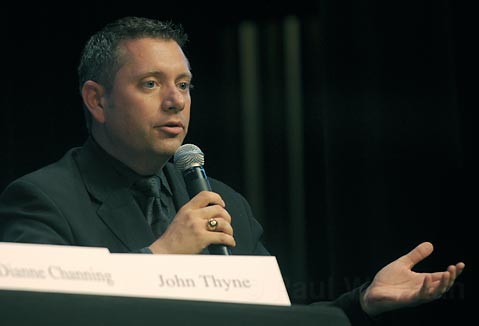John Thyne
2009 City Council Candidate Profile

John Thyne does not blink. Nor, it seems, does he waste much time. Since moving to Santa Barbara in 1999, he’s started three companies, the best known of which is the real estate firm of Goodwin & Thyne. He gives blood 57 times a year, is active with Our Lady of Sorrows, and is president of Santa Barbara Catholic Singles Club. He was president of Leadership Santa Barbara, teaches at Santa Barbara College of Law, and participates with the Teddy Bear Cancer Fund. And now he wants to serve on the City Council. Thyne said he hopes to combine his sense of social justice, inculcated through his Catholic upbringing, with a business-minded pragmatism.
With voters angry, scared, and frustrated, Thyne said he worries there could be a backlash. “What’s at stake is overreaction,” he said. “The pendulum has swung too far to the left. Now it could swing too far to the right. It’s a very reactionary election.” As an outsider – despite the breath of his civic involvement, Thyne has no experience on city boards or commissions – Thyne contends he can help City Hall out of the entrenched habits that helped put it behind the fiscal eight-ball. Typically city departments are budgeted based on what they spent the previous year. This system, Thyne said, rewards departments that spend all their money, but does not reward departments that save money through efficiencies.
In the long term, Thyne said City Hall should apply for a grant from the Public Utilities Commission to install car battery charging stations in Santa Barbara. “We should be part of the electric car infrastructure,” he said. “It’s a green technology that will bring jobs and money to Santa Barbara.” In the short-term, however, Thyne said City Hall should not impose any kind of new “sin tax” on downtown bar owners. City statistics fail to reflect all the business that bar patrons generate for nearby stores, thus understating the full contribution bars make to city revenues. “When you try to effectuate behavioral change by taxing people,” he said, “it will lead to the slippery slope of social inequity.”
Thyne said he saw the gang stabbing on State Street that rocked Santa Barbara two years ago. “I was there,” he said. “I saw Angel get killed.” Kids will join gangs, he argued; it’s their nature to belong. City Hall needs to provide safer alternatives. And the numbers are manageable. Of the 450 juveniles associated with gangs in Santa Barbara, he said 110 were the hard core trouble-makers. He also argued City Hall needs to consider imposing a gang injunction targeting known gang members and prohibiting them from certain locations and activities. Law enforcement officials have been decidedly lukewarm in their response, noting that injunctions are exceptionally labor intensive, expensive, and not uniformly effective. Thyne credited gang injunctions with reducing youth violence in Oxnard, Los Angeles, and Lompoc by 30 percent. “People who say we just need to love our children do not appreciate the scope of the problem in Santa Barbara,” he said.
Thyne grew up in Boston, where his family experienced an economic roller coaster. His brother is a famous TV actor, who has contributed generously to Thyne’s campaign. Initially, there was great buzz about Thyne’s candidacy. Given the city’s budgetary woes, Thyne’s business savvy was clearly an asset. Nor did it hurt among liberal voters that councilmember Das Williams was whispering nice things about Thyne’s commitment to social justice. In his first fiance report, Thyne revealed he’d raised more than any council candidate: $54,000. But when it subsequently came out that Thyne violated the terms of his probation on an earlier DUI conviction by driving after having a couple of drinks – he was not legally drunk – his campaign appeared to falter. In his second campaign finance statement, Thyne had raised only $2,000 over two months. But Thyne insists that his campaign remains buoyant, and that he raised $12,500 in just one fundraiser.
Thyne advocates a return to district elections, which will mend the disconnect between City Hall and city residents. “Right now, if you have a problem, who do you go to? Which councilmember is your councilmember?” he asked. “The at-large system is not a practical way to hold them accountable.” Thyne has opposed Measure B, arguing that the construction of three ugly buildings on Chapala Street hardly constitutes sufficient justification to amend the city’s charter. “If you don’t allow more housing downtown, where do you think it will go?” he asked. “It will sprawl out to the outlying neighborhoods. You can’t legislate reality.”
Like many of the candidates running for office, Thyne expressed concern at the sheer size of the contributions made by Randall Van Wolfswinkel. “Some people like the man. Some don’t,” he said. “But whether he’s a good guy or not, we all can agree that the money and political influence need to be less intertwined, not more.”



